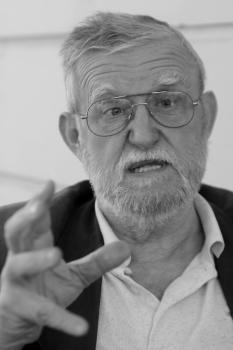writer

Feldek Ľubomír
(*1936)

Feldek studied Slovak language at the University of Pedagogy in Bratislava.
During his studies he started to work as an editor in the Mladé Letá publishing
house and published in Mladá Tvorba magazine. Before graduating he was fired
for political reasons and worked as a printer operator. Later he became an editor for the
magazine of the Tesla television factory in the region of Nižná Orava (Lower
Orava), and in 1961–1973 he worked as a freelance writer and publisher. From
1973 he again worked as an editor in the department of local and foreign literature
of the Slovenský spisovateľ publishing house. In 1976–1979 he worked as a
dramaturg in the Poetic Ensemble of the Nová scéna Theatre in Bratislava. From
1986 he again worked as a freelance artist. In 1989 he signed an appeal for releasing
Václav Havel from prison, another against the arrest of Ján Čarnogurský, and he also
signed a political manifesto “Niekoľko viet” (Few Sentences) against the brutality
and interventions of the Communist regime. In November 1989 he co-founded
the Verejnosť proti násiliu (Public against Violence) Party and for some months he
worked as editor-in-chief of the Ahoj, Európa weekly, published as a supplement to
the Verejnosť daily. In the early 1990s, after publishing satirical poems about the political situation in
Slovakia, he moved to Prague where he lived with his family and worked as a freelance writer.
Today he lives and works again in Bratislava. Ľubomír Feldek is considered a versatile artist
and master of all literary genres. He entered literature with poetry during his studies, and together with Stacho, Michalkovič and Ondruš he created the so-called Trnava Group which was later given poetologic term
‘The Concretists’. This group of poets brought to the then schematic
poetry (abstract declarative lyricism) sensual concretism, imaginary
fantasy, a return to the sensitivity of childhood, metaphor and experiment. The
programme also contained modernization of literature for children and translation,
which the Concretists regarded as a creatively equal component of a literary work.
Feldek became a dominant figure of the group and transported the above-mentioned
attitudes into his poetry and works for children. He debuted with a book of prose
in verse for children Hra pre tvoje modré oči (The Play for Your Blue Eyes) (1959), in
1961 his first poetry collection was published named Jediný slaný domov (The Only
Salty Home) and later he pursued only translations and books for children (Zlatúšik
(Sweetheart), 1965; Hlava, ktorú som mal vtedy (The Head I Used to Have), 1967;
Botafogo, 1967; Rozprávky na niti (Stories on a Thread), 1970; Modrá kniha rozprávok
(Blue Book of Stories), 1974; Zelená kniha rozprávok (Green Book of Stories), 1983;
Perinbaba 1987; Modrozelená kniha rozprávok (Blue and Green Book of Stories), 2004).
For his works for children he received a number of national literary
awards, and his Blue Book of Stories was added to the IBBY Roll of Honour. Ten years
later he showed his distinctive poetic talent again – he published books of poetry – Kriedový
kruh (A Chalk Circle) (1970), Paracelsus (1973), Dvaja okolo stola (Two Around the
Table) (1976), Poznámky na epos (The Notes for an Epic) (1980), Slovák na mesiaci (A
Slovak on the Moon) (1986), Plakať je krásne (Crying is Beautiful) (1990), Usmiaty otec
(The Father Smiling) (1991), Odzemok na rozlúčku (A Farewell Odzemok) (1992) in which, using
means of parody and irony, he reacted to the important issues of society of the then society.
His books of prose are a novel parodying the socialist poetry of the 1950s named
Van Stiphout (1980) and Moja žena Oľga a nekonečno (My Wife Olga and Eternity) (2004).
The essential part of Feldek´s activities is his rich translation
and essayist work (Prekliata trnavská skupina (Damned Tranava Group) (2007)) as well as writing of columns for various periodicals, which were published in a book under the name O nákazlivosti šťastia (On the Infectiousness of Happiness) (2009). Ľubomír Feldek is a renowned creative personality of Slovak literary life,
playwright, translator and original creator of literature for children.
theatre plays
